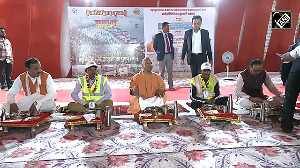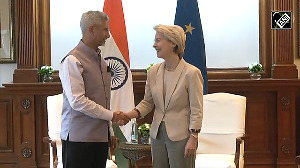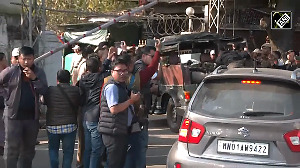It looks just like any ordinary football but the Adidas "smartball" that makes its official debut in the FIFA Under-17 world championship in Peru on Friday could change the face of soccer forever.
 The smartball is fitted with a tiny microchip designed to help a referee decide whether the ball has crossed the line completely for a goal to be scored -- and will also be used to determine whether the ball has gone out of play.
The smartball is fitted with a tiny microchip designed to help a referee decide whether the ball has crossed the line completely for a goal to be scored -- and will also be used to determine whether the ball has gone out of play.
FIFA president Sepp Blatter, traditionally a staunch opponent of technology, has given his blessing to the experiment in Peru and has said that if it is successful, it can be used in the World Cup finals in Germany next summer.
The ball was unveiled in Lima before the tournament starts on Friday and FIFA Secretary-General Urs Linsi told Reuters the "smartball" and so-called goal-line technology, developed by Adidas with German company Cairos AG and the German Fraunhofer Institute -- was in no way a substitute for the eyes and experience of the referee.
RADIO SIGNAL
"The referee is in charge, he's the boss on the pitch and that won't change. This is an aid to the referee," he said.
The microchip -- less than half an inch in size -- sends out a radio signal when the ball crosses the touchline, as if it had touched an electric fence.
That signal is relayed by up to 12 antennae positioned in the corners of the pitch to a computer which then sends a message to a watch worn on the referee's wrist in less than one second, Guenter Pfau, Adidas' manager for relations with FIFA, told Reuters.
The message makes a virtually inaudible signal and the referee need never even use the technology, unless he is in doubt, Pfau said.
If so, a quick glance at the watch will reveal the word "goal" or no message, indicating no goal. Any goal messages are stored in the watch's memory with the time logged.
FINAL SAY
Linsi said the referee would always have the final say and could ignore even a goal message from the smartball.
The 16-nation Under-17 championship kicks off on Friday with Uruguay playing Mexico in Lima and ends on Oct 2.
Matches will be played in five venues equipped with the latest artificial turf. The smartball will be used in all games except those played in the northern jungle city of Iquitos because the stadium was not ready in time, Pfau said.
The smartball's signal cannot be disturbed by radios or cellphones. "It's encrypted, it can't be hacked into," he added.
The smartball has been tested once, in February, at an unofficial friendly in Nuremberg, but Friday will be its first official outing.
BOARD GAMES
Members of the International Football Association Board -- soccer's ultimate law-making body -- will travel to Peru to see the experiment in some of this month's games.
A report will then be submitted to the next meeting of the Board in the spring and if the experiment has been deemed a success a decision will be taken on whether it will be used in the World Cup finals in Germany next summer.
Blatter told journalists in London earlier this month that there might be no need for the technology to determine a goal at all in Peru.
"There might not be one incident where there is a doubt," he said, "it could happen, but if it does, we can arrange a match outside the tournament using the technology and set up a situation to test it."
Along with hosts Peru, the 15 other competing countries are China, Qatar, North Korea, Ghana, Gambia, Ivory Coast, Italy, Turkey, Netherlands, United States, Mexico, Brazil, Uruguay, Australia and Costa Rica.








 © 2025
© 2025